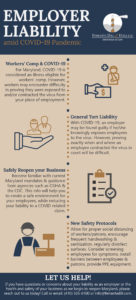Employer Liability amid COVID-19 Pandemic
As Maryland progresses through Governor Hogan’s Roadmap to Recovery phases of reopening, it’s imperative that business owners take the time to understand their potential sources of liability once employers return to work. What if an employee contracts COVID-19 while at work? Does workers’ compensation cover exposure to and contraction of COVID-19? What if you or another employee knowingly exposes others to the virus and they get it, are you liable? What requirements are there for your business to adhere to OSHA and CDC guidelines for reopening safely amidst the ongoing pandemic? Read on to get answers to these questions. Please be aware that this blog contains some general information but consultation with an attorney prior to taking any action is always advisable.
Does Workers’ Comp cover COVID-19?
If an employee gets hurt or contracts an illness or disease at your workplace in Maryland, he or she has a right to recover damages from you by filing a workers’ compensation claim. A disease or illness that causes temporary or permanent incapacity and is determined to be the direct result of the nature of employment is one that you may be liable to cover as an employer. Due to COVID-19’s high infection rate and rate of transmission, exposure to the virus is all but unavoidable as employees return to work. For Maryland, COVID-19 is considered a compensable illness, or an illness eligible for workers’ comp.
One thing to keep in mind, though, is the difficulty workers will have in proving they were exposed to and/or contracted the virus from your place of employment. An effective workers’ comp claim will have to prove, beyond a shadow of a doubt, that exposure to/contraction of the virus was the direct result of the working environment. If you have multiple employees who test positive for the virus, the case could end in their favor. However, if you, the employer, can establish that the employee filing the claim could have been exposed to COVID-19 elsewhere (from friends or family, perhaps), then the case could potentially end in your favor.
What is General Tort Liability?
General tort liability relates to a set of specific provisions that are part of Tort Law. General tort liability occurs when a person intentionally or negligently commits an illegal act and causes damage as a result. In the times of COVID-19, an employer may be found guilty of general tort liability if he or she knowingly exposes employees to the virus.
Employees can use general tort liability as a work-around for failed workers’ compensation claims. Basically, if healthy Employee A is exposed to COVID-19 because unhealthy Employee B did not adhere to social distance guidelines, or worse, did not disclose a positive COVID-19 test result, then Employee B could be liable if Employee A becomes sick. Additionally, employers may also be liable depending on their level of notice, action or lack thereof.
How can I safely reopen my place of business?
All employers should familiarize themselves with current state mandates, as well as guidance put forth by agencies such as OSHA and the CDC. These mandates and guidelines will help you to create a safe environment for your employees, while reducing your liability to a COVID-related claim.
In general, each publication is requiring that, at a minimum, employers are ensuring measures are being taken to allow for proper social distancing of workers and patrons, encouraging frequent handwashing and sanitization, regularly disinfecting surfaces and limiting in-person interactions or keeping group numbers small. Additionally, employers can screen employees by way of temperature checks or requiring a negative test result prior to returning to work. Employers can also ask that all employees disclose their symptoms, disclose information regarding their level of risk of exposure, and can send sick employees home. Employers are required to maintain employee privacy and confidentiality and not disclose sensitive information to others.
Within its publication providing guidance on reopening workplaces, OSHA also outlined four categories of industry and their level of risk of exposure to COVID-19. Depending on your industry’s risk level, you may also be obligated to provide Personal Protection Equipment (PPE) to your employees. PPE can include face masks or shields, gowns and/or gloves. You may also be required (or strongly encouraged) to install additional protection in the form of glass or plexiglass barriers between your employees as well as employees and patrons.
Let us know if you need help!
The attorneys and staff at Ferrante, Dill and Hisle, LLC are experienced in dealing with businesses of all shapes and sizes. If you have questions or concerns about your liability as an employer or the health and safety of your business as we begin to reopen Maryland, please reach out to us today! You can give us a call at (410) 535-6100 or send us an email to info@ferrantedill.com. We’re here for you, pandemic or not. We’re available for video chats and telephone meetings 9 a.m. to 5 p.m. Monday through Friday and have the technology in place to help move your case along.
Disclaimer!
This blog post that is published by Ferrante & Dill is only available for informational purposes and should not be considered legal advice. By viewing these blog posts, the reader understands there is no attorney-client relationship between the blog publisher and the reader. The blog post should not be used as a substitute for legal advice from a licensed professional attorney, and we recommend readers to consult their own legal counsel on any specific legal questions concerning a specific situation.







